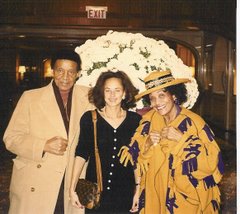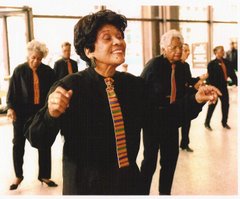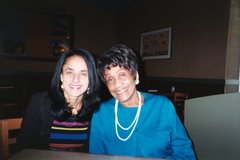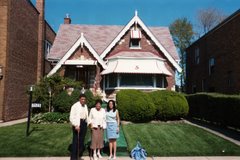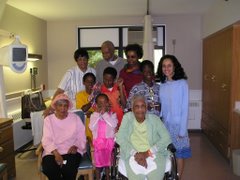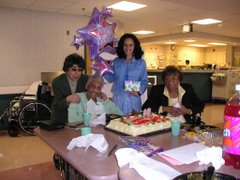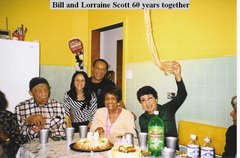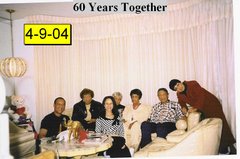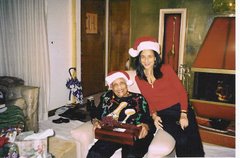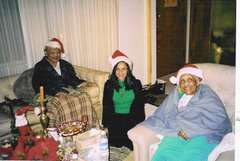Here is an article published in today's New York Times
link:
http://www.nytimes.com/2008/10/07/us/07aging.html?_r=1&em&oref=sloginIn ‘Sweetie’ and ‘Dear,’ a Hurt for the Elderly
By
JOHN LELANDProfessionals call it
elderspeak, the sweetly belittling form of address that has always rankled older people: the doctor who talks to their child rather than to them about their health; the store clerk who assumes that an older person does not know how to work a computer, or needs to be addressed slowly or in a loud voice. Then there are those who address any elderly person as “dear.”
“People think they’re being nice,” said Elvira Nagle, 83, of Dublin, Calif., “but when I hear it, it raises my hackles.”
Now studies are finding that the insults can have health consequences, especially if people mutely accept the attitudes behind them, said Becca Levy, an associate professor of epidemiology and
psychology at
Yale University, who studies the health effects of such messages on elderly people.
“Those little insults can lead to more negative images of aging,” Dr. Levy said. “And those who have more negative images of aging have worse functional health over time, including lower rates of survival.”
In a long-term survey of 660 people over age 50 in a small Ohio town, published in 2002, Dr. Levy and her fellow researchers found that those who had positive perceptions of aging lived an average of 7.5 years longer, a bigger increase than that associated with exercising or not
smoking. The findings held up even when the researchers controlled for differences in the participants’ health conditions.
In her forthcoming study, Dr. Levy found that older people exposed to negative images of aging, including words like “forgetful,” “feeble” and “shaky,” performed significantly worse on
memory and balance tests; in previous experiments, they also showed higher levels of stress.
Despite such research, the worst offenders are often health care workers, said Kristine Williams, a nurse gerontologist and associate professor at the
University of Kansas School of Nursing.
To study the effects of elderspeak on people with mild to moderate
dementia, Dr. Williams and a team of researchers videotaped interactions in a nursing home between 20 residents and staff members. They found that when nurses used phrases like “good girl” or “How are we feeling?” patients were more aggressive and less cooperative or receptive to care. If addressed as infants, some showed their irritation by grimacing, screaming or refusing to do what staff members asked of them.
The researchers, who will publish their findings in The American Journal of
Alzheimer’s Disease and Other Dementias, concluded that elderspeak sent a message that the patient was incompetent and “begins a negative downward spiral for older persons, who react with decreased self-esteem,
depression, withdrawal and the assumption of dependent behaviors.”
Dr. Williams said health care workers often thought that using words like “dear” or “sweetie” conveyed that they cared and made them easier to understand. “But they don’t realize the implications,” she said, “that it’s also giving messages to older adults that they’re incompetent.”
“The main task for a person with Alzheimer’s is to maintain a sense of self or personhood,” Dr. Williams said. “If you know you’re losing your cognitive abilities and trying to maintain your personhood, and someone talks to you like a baby, it’s upsetting to you.”
She added that patients who reacted aggressively against elderspeak might receive less care.
For people without cognitive problems, elderspeak can sometimes make them livid. When Sarah Plummer’s pharmacy changed her monthly prescription for
cancer drugs from a vial to a contraption she could not open, she said, the pharmacist explained that the packaging was intended to help her remember her daily dose.
“I exploded,” Ms. Plummer wrote to a
New York Times blog, The New Old Age, which asked readers about how they were treated in their daily life.
“Who says I don’t take my medicine as prescribed?” wrote Ms. Plummer, 61, who lives in Champaign, Ill. “I am alive right now because I take these pills! What am I supposed to do? Hold it with vice grips and cut it with a hack saw?’”
She added, “I believed my dignity and integrity were being assaulted.”
Health care workers are often not trained to avoid elderspeak, said Vicki Rosebrook, the executive director of the Macklin Intergenerational Institute in Findlay, Ohio, a combined facility for elderly people and children that is part of a retirement community.
Dr. Rosebrook said that even in her facility, “we have 300 elders who are ‘sweetie’d’ here. Our kids talk to elders with more respect than some of our professional care providers.”
She said she considered elderspeak a form of bullying. “It’s talking down to them,” she said. “We do it to children so well. And it’s natural for the sandwich generation, since they address children that way.”
Not all older people object to being called sweetie or dear, and some, like Jan Rowell, 61, of West Linn, Ore., say they appreciate the underlying warmth. “We’re all reaching across the chasm,” Ms. Rowell said. “If someone calls us sweetie or honey, it’s not diminishing us; it’s just their way to connect, in a positive way.”
She added, “What would reinforce negative stereotypes is the idea that old people are filled with pet peeves, taking offense at innocent attempts to be friendly.”
But Ellen Kirschman, 68, a police psychologist in Northern California, said she objected to people calling her “young lady,” which she called “mocking and disingenuous.” She added: “As I get older, I don’t want to be recognized for my age. I want to be recognized for my accomplishments, for my wisdom.”
To avoid stereotyping, Ms. Kirschman said, she often sprinkles her conversation with profanities when she is among people who do not know her. “That makes them think, This is someone to be reckoned with,” she said. “A little sharpness seems to help.”
Bea Howard, 77, a retired teacher in Berkeley, Calif., said she objected less to the ways people addressed her than to their ignoring her altogether. At recent meals with a younger friend, Ms. Howard said, the restaurant’s staff spoke only to the friend.
“They ask my friend, ‘How are you; how are you feeling?’ just turning on the charm to my partner,” Ms. Howard said. “Then they ask for my order. I say: ‘I feel you’re ignoring me; I’m at this table, too.’ And they immediately deny it. They say, no, not at all. And they may not even know they’re doing it.”
Dr. Levy of Yale said that even among professionals, there appeared to be little movement to reduce elderspeak. Words like “dear,” she said, have a life of their own. “It’s harder to change,” Dr. Levy said, “because people spend so much of their lives observing it without having a stake in it, not realizing it’s belittling to call someone that.”
In the meantime, people who are offended might do well to follow the advice of Warren Cassell of Portland, Ore., who said it irritated him when “teenage store clerks and about 95 percent of the rest of society” called him by his first name. “It’s the faux familiarity,” said Mr. Cassell, 78.
But he mostly shrugs it off, he said. “I’m irked by it, but I can’t think about it that much,” he said. “There are too many more important things to think about.”








